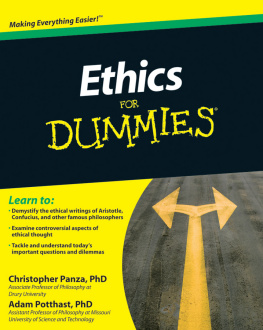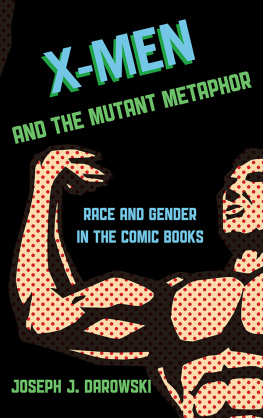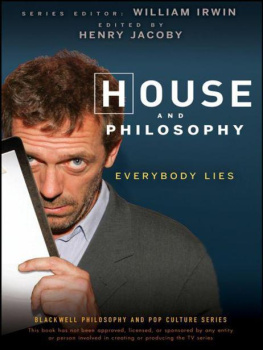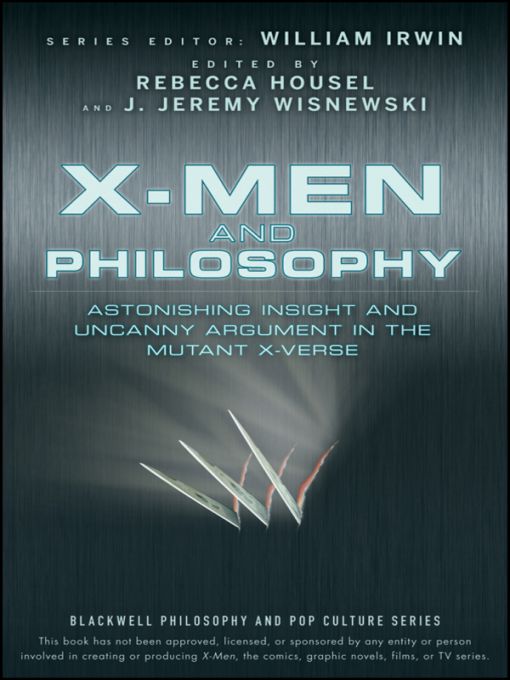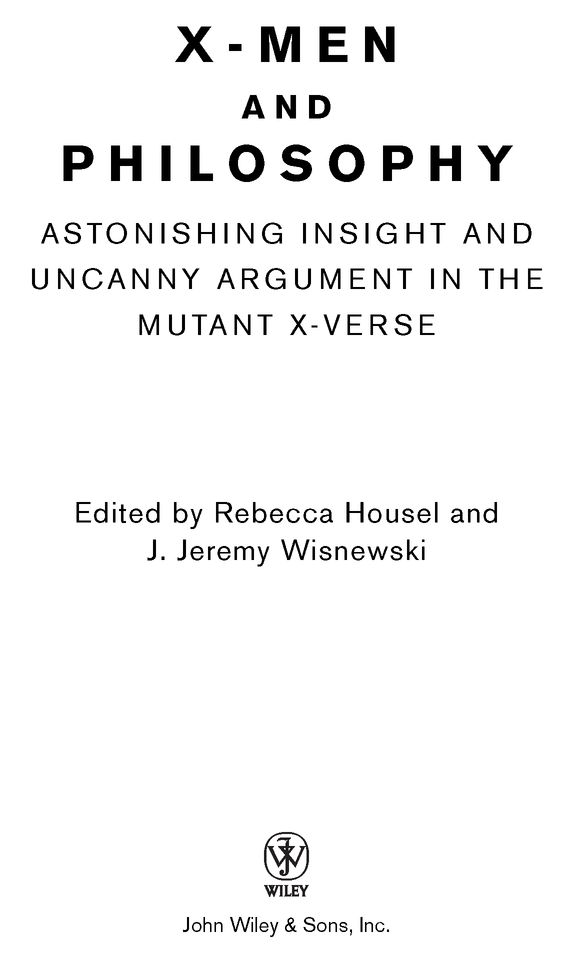Table of Contents
The Blackwell Philosophy and Pop Culture Series
Series Editor: William Irwin
South Park and Philosophy
Edited by Robert Arp
Metallica and Philosophy
Edited by William Irwin
Family Guy and Philosophy
Edited by J. Jeremy Wisnewski
The Daily Show and Philosophy
Edited by Jason Holt
Lost and Philosophy
Edited by Sharon Kaye
24 and Philosophy
Edited by Richard Davis, Jennifer Hart Week,
and Ronald Weed
Battlestar Galactica and Philosophy
Edited by Jason T. Eberl
The Office and Philosophy
Edited by J. Jeremy Wisnewski
Batman and Philosophy
Edited by Mark D. White and Robert Arp
House and Philosophy
Edited by Henry Jacoby
X-Men and Philosophy
Edited by Rebecca Housel and J. Jeremy Wisnewski
Final Fantasy and Philosophy
Edited by Jason P. Blahuta and Michel S. Beaulieu
Heroes and Philosophy
Edited by David Kyle Johnson
Watchmen and Philosophy
Edited by Mark D. White
To mutants everywhere
ACKNOWLEDGMENTS
Superheroic Thanks to X-tra Special Humans and Mutants Alike!
The editors wish to thank comic greats Stan Lee and the late Jack Kirby, the real X-perts!
Wed also like to thank series editor Bill Irwin for his X-vision and X-traordinary editorial instincts! Love ya, Bill! Special thanks go to our beloved contributors, whose lively intellects and creativity help make this volume a superpower-packed X-ploration into the vast space-time of the X-Verse. We also want to give our appreciation to Connie Santisteban, Eric Nelson, and the entire Wiley team for their publishing super-prowess.
As for the mutants: Beast, for being both a science geek and a badass; Wolverine, for being short; Mystique for bringing blue back into fashion; Phoenix Force, for being the ultimate sentient cosmic force of life and death (cmon!); and every other mutant superhero, either in the pages of a Marvel comic or in the recesses of a human mind yet to begin a great heros journey....
Jeremy wishes to personally thank Meg Lonergan, now an old pro at making things happen; she did an X-cellent job helping with the copyediting and the indexkeep it up, Sparky! Nico Meyering and Nick Forst read versions of the manuscript and offered some useful initial feedback. Nick gets an X-tra thank you for donating his illustrating abilities (and his imagination) to the book. (Nick is responsible for Jeremys inner superhero at the end of chapter 17.) Jeremy is grateful to his wife, Dorothy, for putting up with his eccentricities (yet again), and his daughter, Audrey, for letting him play with her toys.
Rebecca would like to send special thanks to Mighty George Dunn, Bob Housel, Aaron Fields, Connie Santisteban, Stephanie Shadowcat Collins, and Marguerite Schwartz for lending super-vision to sections of the Marvel-ous manuscript. Bill Irwin gets a Giant-Sized shout out for reading countless e-mails over four years with eighties trivia and X-Men pleas. Tom Morris also gets a nod for accepting Rebeccas first article ever (!) on X-Men in his 2005 Superheroes volume. Rebeccas sincere appreciation goes to her husband, Bob, who lovingly made superhuman efforts in the domestic sphere while Rebecca typed away into the wee hours of the morning, and to her son, Gary, who has been her comic partner-in-crime for the better part of the last twenty years.
INTRODUCTION
You Are About to Embark on an X-perience with the Strangest Heroes of All
The X-Men franchise has made billions of dollars over the last forty-five years from major motion pictures, animated television shows, video games, and, of course, the best-selling comic series in American history. The Marvel X-Verse is a large and diverse place full of complex storylines, timelines, seemingly endless characters (can you believe the first volume started with only seven?!), andof coursephilosophy.
The first X-Men comic featured Professor Xavier, Marvel Girl, Angel, Beast, Iceman, and Cyclops: five teenagers trying to learn how to control their mutant powers, or extra powers, at Xaviers School for Gifted Youngsters. Oh, and, of course, Magnetos villainous yet relatable character was also introduced as part of the original cast. And right there at the beginning, the big questions were being asked: What are our obligations to one another? What does it mean to be human?
What are the implications of evolution for the future of human (and mutant) civilization?
X-Men comics were one of the first Marvel series to feature female characters as the leads in multiple storylines. X-Women are shown as strong and powerful, equal to the men around them. X-Men comics also developed a diverse population of mutant superheroes that included African characters such as Storm, Native Americans like Dani Moonstar and Thunderbird, and Asian characters such as Jubilee and Lady Deathstrike. Originally, Stan Lee named the comic The Mutants, a less gender-specific title, but his editor thought the audience would not understand what or who a mutant was, so Lee suggested X-Men because the main characters had extra powers and were led by a man named Professor X. That was also a rather new concept: having a handicapped leader in Professor X, who, despite being wheelchair-bound, is still one of the most powerful, influential heroes in the X-Men series. Here, too, we can see the underlying philosophical spirit of the X-Verse: All of our traditional hierarchies are scrutinized, questioned, and reimagined. The X-Verse is a deeply philosophical place where our world is dismantled, where our assumptions are turned against us, and where, strangely, we see ourselves in ways that only mutants (and philosophers) can show us. So if youre a human, this book is for you.
Your X-perience is about to begin. Enjoy the ride!
NOTES
This was the tagline used on the cover of the first X-Men comic in September 1963.
This is more money than philosophy has made since emerging on the cultural scene some 2,500 years ago.
X1 : ORIGINS
THE X-FACTOR IN THE EXISTENTIAL
I
THE LURE OF THE NORMAL: WHOWOULDNT WANT TO BE A MUTANT?
Patrick D. Hopkins
In the third X-Men movie, The Last Stand, a cure is discovered that suppresses the activity of the mutant gene, turning mutants into ordinary humans. Storm, the weather-controller, reacts by asking, Who would want this cure? I mean, what kind of coward would take it just to fit in? Meanwhile, Roguewhose touch can sap the life, energy, and abilities of other peopleis preparing her trip to the pharmaceutical clinic.
Given the prejudice, fear, and persecution of mutants, some X-fans empathize with Rogue and can easily imagine wanting to be regular people. But other fans, especially those who have idealized or identified with the X-Men, roll their eyes and shake their heads about Rogues decision, seeing in it the rejection of something glorious, unique, and desirable. Why would anyone choose the ordinary, the mundane, over the fantastic and the extraordinary? What kind of person wouldnt want to be a mutant?


